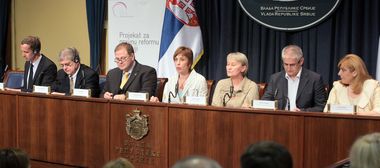- Serbia
Get to know Serbia
- Citizens
Culture and science
Health services
Pension and disability insurance
- Business
Employment
Economy
- Media
- Government
- Contact
Keep in touch
Contact form
Back
Keepin touch
Whether you have a question, comment, suggestion or any problem in the purview of the government, send us your message and we will try to respond as soon as possible. If your problem is not in our purview, we will forward your message to the relevant institution.
Q:
A:
Germany's support in implementation of legal reforms
Belgrade,
8 June 2011
Head of the European Integration Office Milica Delevic said today that the objective of the project "Support to the implementation of legal reforms in Serbia, phase 1 (2011-2013)" is to support and monitor the process of Serbia's EU integration and improve the legal system and harmonise it with the legal and economic systems of countries in the region.
Delevic recalled that Germany in the past decade has been a big donor to Serbia in the European integration process and announced that this year’s assistance from Germany will stand at €117 million, most of which will be in soft loans.
German Ambassador to Serbia Wolfram Maas noted that Serbia should speed up the implementation of legislative reforms so as to create conditions to end the year with the status of a candidate for EU membership.
Maas said that in the past few weeks, Serbia has made a big step on the path towards the Union, but that much remains to be done, especially in reforming the legal system.
Now that Ratko Mladic is extradited to the International Criminal Tribunal for the Former Yugoslavia (ICTY), we can concentrate on that job, said Maas, and announced that Serbia will continue to have strong support from Germany in the implementation of reforms.
He recalled that Germany has helped Serbia in implementing reforms with more than €1 billion over the past decade, and expressed the hope that Serbia will be able to justify that trust.
Maas said that it is very important for Serbia to continue the reform of the rule of law, because it is the prerequisite to attract more foreign investment.
Delevic said that she has no doubts that the Dutch Parliament will ratify the Stabilisation and Association Agreement (SAA) between Serbia and the EU after it receives the formal text of the report that ICTY’s Chief Prosecutor Serge Brammertz submitted to the UN Security Council.
The Government of the Netherlands should send next week a report on Brammertz’ position before the UN Security Council as well as a recommendation to ratify the agreement between Serbia and the EU.
With the extradition of Ratko Mladic to the ICTY, Serbia has proven that it respects the rule of law, she stressed and reminded that the Netherlands has so far been the most critical of Serbia because of the fact that Mladic was not available to the tribunal.
German Ambassador to Serbia Wolfram Maas noted that Serbia should speed up the implementation of legislative reforms so as to create conditions to end the year with the status of a candidate for EU membership.
Maas said that in the past few weeks, Serbia has made a big step on the path towards the Union, but that much remains to be done, especially in reforming the legal system.
Now that Ratko Mladic is extradited to the International Criminal Tribunal for the Former Yugoslavia (ICTY), we can concentrate on that job, said Maas, and announced that Serbia will continue to have strong support from Germany in the implementation of reforms.
He recalled that Germany has helped Serbia in implementing reforms with more than €1 billion over the past decade, and expressed the hope that Serbia will be able to justify that trust.
Maas said that it is very important for Serbia to continue the reform of the rule of law, because it is the prerequisite to attract more foreign investment.
Delevic said that she has no doubts that the Dutch Parliament will ratify the Stabilisation and Association Agreement (SAA) between Serbia and the EU after it receives the formal text of the report that ICTY’s Chief Prosecutor Serge Brammertz submitted to the UN Security Council.
The Government of the Netherlands should send next week a report on Brammertz’ position before the UN Security Council as well as a recommendation to ratify the agreement between Serbia and the EU.
With the extradition of Ratko Mladic to the ICTY, Serbia has proven that it respects the rule of law, she stressed and reminded that the Netherlands has so far been the most critical of Serbia because of the fact that Mladic was not available to the tribunal.
-
 Belgrade, 22 January 2025
Belgrade, 22 January 2025Egypt one of Serbia’s closest partners on international stage
-
 Belgrade, 9 July 2024
Belgrade, 9 July 2024Support for 104 associations in diaspora that preserve Serbian language, culture
-
 Belgrade, 15 April 2024
Belgrade, 15 April 2024Competition for StarTech grants open until 31 May
-
 Belgrade, 2 October 2023
Belgrade, 2 October 2023Serbia respects Resolution 1244 and will do everything to preserve peace
-
 Belgrade, 13 September 2023
Belgrade, 13 September 2023Day of Serbian Unity to be celebrated outside borders of Serbia, Republika Srpska for the first time
-
 Belgrade, 8 August 2023
Belgrade, 8 August 2023RSD 24.2m in state aid paid out to citizens affected by storm
-
 Belgrade, 17 June 2023
Belgrade, 17 June 2023Belgrade is doing everything to preserve peace in Kosovo and Metohija
-
 Belgrade, 15 June 2023
Belgrade, 15 June 2023Slovenia will continue to support Serbia on its way to EU
-
 Belgrade, 5 May 2023
Belgrade, 5 May 2023Emergency measures, tightening of conditions for possessing weapons
-
 Belgrade, 3 May 2023
Belgrade, 3 May 2023Three days of mourning in Serbia over tragedy at Vladislav Ribnikar primary school


